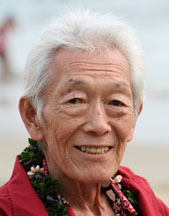1934 – 2008
Tireless advocate for the Asian-American community
Jim Yukihiro Miyano was only a child when the United States entered World War II. An American-born son of Japanese immigrants, Miyano and his family were removed from their Boyle Heights home and sent to a makeshift assembly center at the Santa Anita racetrack in Arcadia. They were soon shuttled off to a Japanese-American internment camp in southeastern Arkansas, where they would remain until the war’s end in 1945.
The Miyano family returned to Los Angeles after the war and rebuilt their lives. The memory of hardships endured as a boy would later compel Miyano to pursue a career helping others in need.
Miyano earned a bachelor’s degree in sociology from Los Angeles State College and served in the U.S. Army as a small arms instructor in Benning, Georgia. He received an MSW from USC in 1960 and went to work for the Los Angeles County Probation Department. He later became the project director of an outreach program for Asian Americans at Special Services for Groups, a Los Angeles-based organization that addresses social ills, health and economic inequalities through advocacy and political action efforts. Miyano also worked as a recreation director in Los Angeles and a county probation officer at the boy’s detention center in Malibu Canyon. His work would contribute significantly to the movement toward community-based services.
Miyano was also an important leader in the Asian-American community. He founded the Asian/Pacific Policy and Planning Council in 1976 and served as the first president of National Asian American Social Workers. He also served as chief-of-staff to former Los Angeles County Supervisor Edmund Edelman and worked with the National Association of Social Workers and other ethnic social work organizations to form the first NASW Minority Social Work Caucus. He led similar efforts with advocacy groups like the Council on Social Work Education and the National Conference on Social Welfare. Miyano tirelessly spearheaded efforts on behalf of his own and other communities in California and became a leader in the process.
